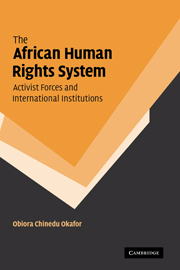Book contents
- Frontmatter
- Contents
- Acknowledgements
- List of abbreviations
- 1 The African human rights system, activist forces, and international institutions: an introduction
- 2 Conventional conceptions of international human rights institutions
- 3 Conventional conceptions of the African system for the promotion and protection of human and peoples' rights
- 4 The impact of the African system within Nigeria
- 5 The utilization of the African system within South Africa
- 6 Limited deployment of the African system within African states: further evidence and a general evaluation
- 7 Toward an extended measure of IHI effectiveness: a quasi-constructivist perspective
- 8 Conclusion
- Select Bibliography
- Index
6 - Limited deployment of the African system within African states: further evidence and a general evaluation
Published online by Cambridge University Press: 17 July 2009
- Frontmatter
- Contents
- Acknowledgements
- List of abbreviations
- 1 The African human rights system, activist forces, and international institutions: an introduction
- 2 Conventional conceptions of international human rights institutions
- 3 Conventional conceptions of the African system for the promotion and protection of human and peoples' rights
- 4 The impact of the African system within Nigeria
- 5 The utilization of the African system within South Africa
- 6 Limited deployment of the African system within African states: further evidence and a general evaluation
- 7 Toward an extended measure of IHI effectiveness: a quasi-constructivist perspective
- 8 Conclusion
- Select Bibliography
- Index
Summary
Introduction
One of the major tasks accomplished in this chapter is the mapping and analysis of the extent and significance of the more modest impact that the African system has had within some other African states (that is, other than Nigeria and South Africa). This discussion will form the basis for the argument that the available evidence points tentatively to the conclusion that the African system (like other IHIs) can under certain conditions contribute to the production of valuable correspondence, facilitated by activist forces, between some of its norms and the behavior of key domestic governmental institutions within some African states (what I have referred to earlier in this book as the “ACHPR phenomenon”). This discussion will of necessity be shorter than our examination, in chapter 4, of the African system's influence within Nigeria. This is explained by the fact that the bulk of the available evidence regarding the African system's domestic impact tends to lie outside these other countries.
The other major task that will be accomplished in this chapter is to attempt to specify, as broadly and accurately as possible, the conditions for the optimization of the African system's impact within African states. This analytical exercise will be grounded in the evidence adduced in chapter 4 (in respect of in Nigeria), chapter 5 (regarding South Africa), and in the present chapter (in respect of a sample of other African countries).
- Type
- Chapter
- Information
- Publisher: Cambridge University PressPrint publication year: 2007



